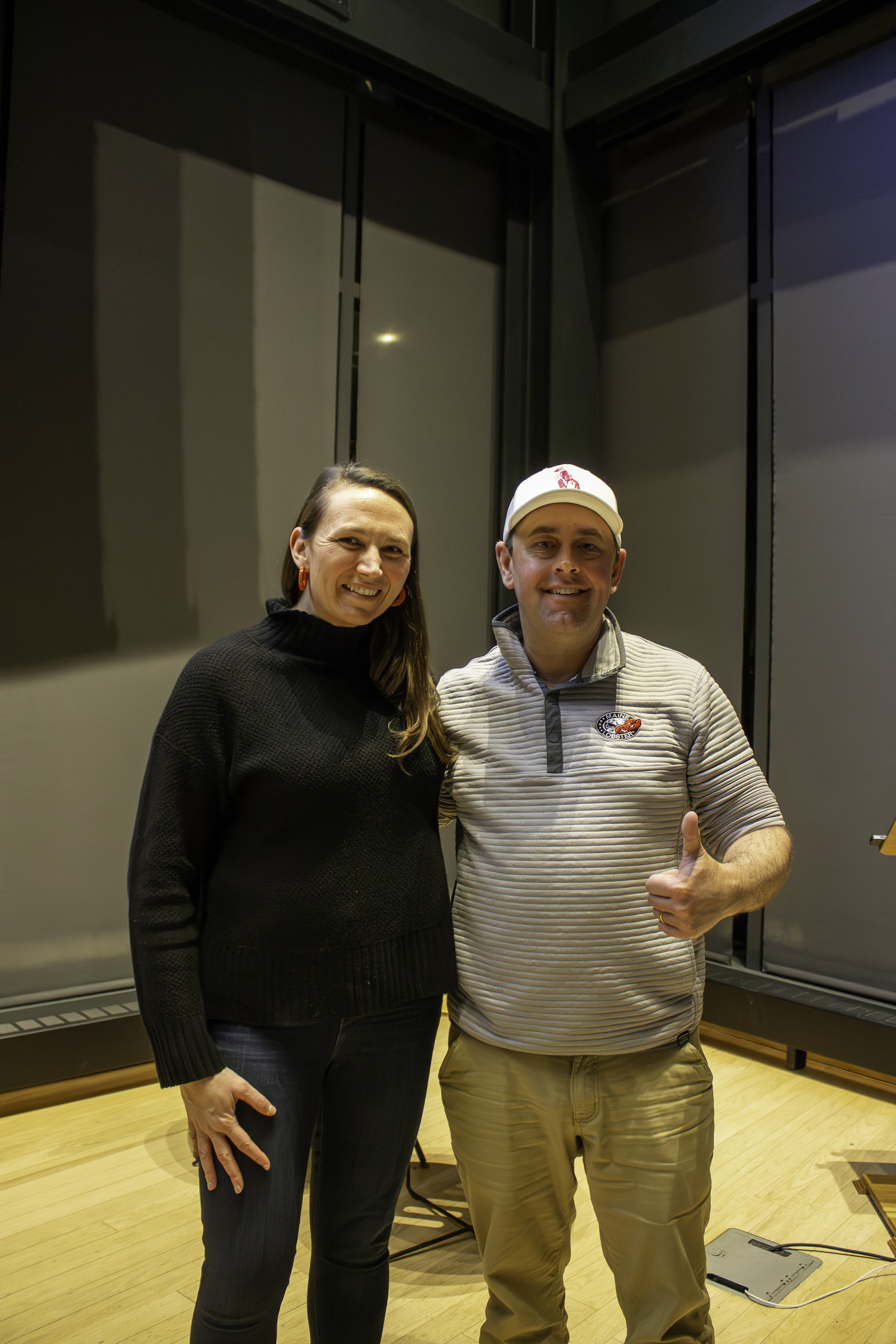“Lobster Tales” talk explores sustainability, innovation in Maine’s lobster industry
April 4, 2025
 Lilli Frank
Lilli Frank“If you remember anything from tonight,” lobsterman and marine biologist Curt Brown joked, “it’s that lobsters can pee out of their faces.”
Last night in the Roux Lantern, Brown joined his childhood friend and colleague Annie Tselikis to deliver a talk on the ins and outs of the lobster industry, tossing in occasional jokes and anecdotes. The talk, entitled “Lobster Tales: How Maine’s Iconic Industry Relies on the Liberal Arts,” discussed the complex environmental, scientific and economic dynamics of lobstering in the region.
Brown and Tselikis began with brief introductions, discussing their shared background growing up in Cape Elizabeth and attending liberal arts colleges. Both well into their careers in the lobster industry, Brown explained his work as a lobsterman and advocate for Maine lobstering, while Tselikis shared her experience in the marketing side of the industry.
“I was always really interested in how this product gets from point A to point B, and what you have to do to build market,” Tselikis said. “And so this is part of what we want to expose you guys to.”
The pair went on to discuss how lobstering is regulated to protect Maine’s wildlife and ecosystems. Showing a picture of a large female lobster on the screen, Brown explained why lobsters carrying a high number of eggs must be marked to prevent them from being caught.
“A female lobster that size can hold over 100,000 eggs and release those every year.… So while it’s a little difficult to throw a couple hundred dollar bills right back in the ocean, in that example, that’s the future of your fishery,” Brown said. “And so the more egg-bearing females that we return, the better return we get on that investment for the future of the fishery.”
On the business side of things, Tselikis explained, strict rules are in place to protect the local lobster industry.
“There is no corporate consolidation of the fleet—every single lobster boat that you see on the water is an independent owner-operator,” Tselikis said. “[Brown] has to be on his boat fishing, he has to be the license holder and he has to own the vessel.”
Brown said that, each year, more opportunities arise to use lobsters more sustainably. Echoing the theme of liberal arts, Brown discussed the role liberal arts students might play in this work.
“Three hundred million pounds, between the U.S. and Canada, are harvested every year. Probably 30 to 40 percent of that is not even usable at this point in time.… And that’s where we need smart people like you who understand the chemistry and the physiology of these lobsters to [find out how to] utilize them,” Brown said. “In our industry, we’re good at getting lobster from Portland, Maine, to anywhere in the world alive, but finding utilization for the components of those shells and other opportunities, that’s the future of our industry right there.”
On top of his work as a lobsterman, Brown is a marine biologist who researches the life stages of Maine lobster populations. Brown discussed the strong connection between his capacity as a scientist and his work selling lobster commercially.
“When we know what’s happening year in and year out with these tiny little one-month-old lobsters, it helps me make decisions about my business going forward with this boat, with my traps, with my family, with my community,” Brown said.
Tselikis also emphasized the importance of research and sustainability for turning a profit in the lobster business.
“Every customer that we sell to, whether it’s a supermarket or a restaurant chain or a major broadline distributor like Cisco or U.S. Foods, they are all looking for us with an expectation that there is some sort of sustainability, whether it’s a third-party certification or something else,” Tselikis said.
Layla Silva ’27 attended last night’s talk and expressed gratitude for the chance to learn more about Maine’s iconic fishing industry. When asked what she will take away from the talk, she began by echoing Brown’s humorous remark.
“Well, one, that lobsters can pee out of their face,” Silva said. “But also that there are so many different ways to get involved, and you don’t have to be out on a lobster boat to be supporting the lobster industry.”

Comments
Before submitting a comment, please review our comment policy. Some key points from the policy: